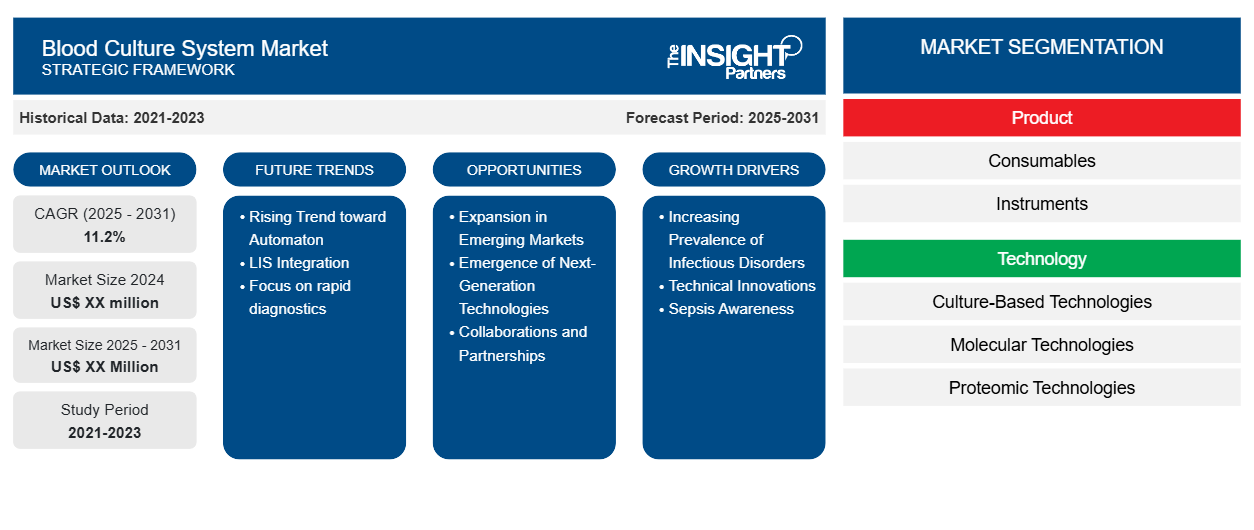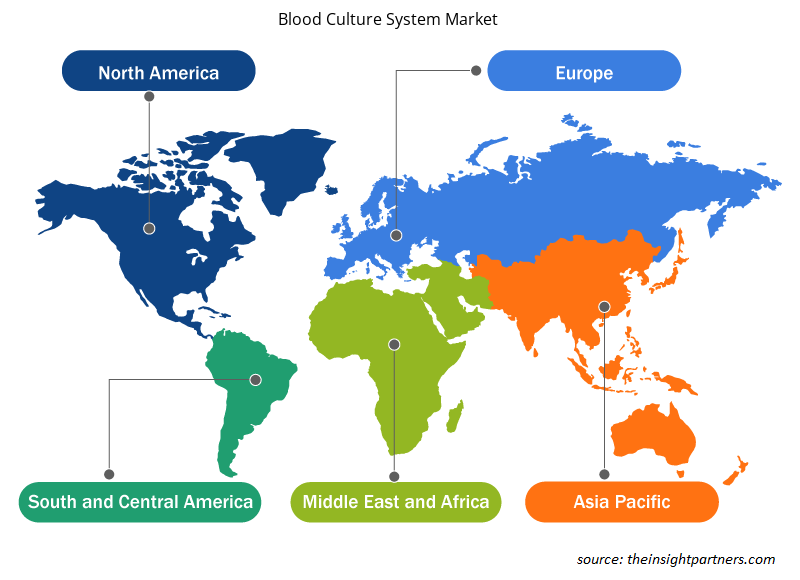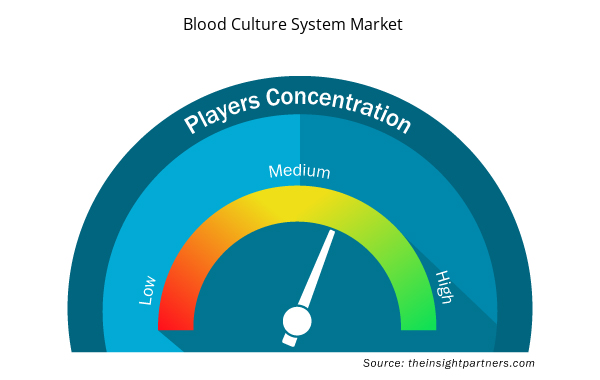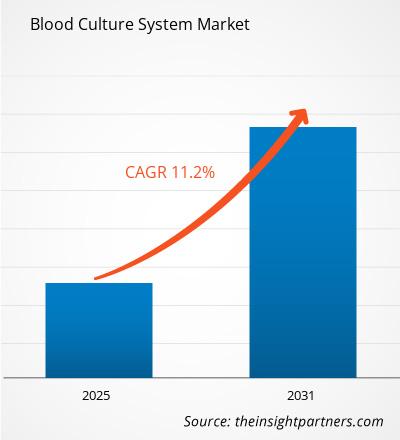The Blood Culture System Market is expected to register a CAGR of 11.2% from 2025 to 2031, with a market size expanding from US$ XX million in 2024 to US$ XX Million by 2031.
The report is segmented by Product (Consumables, Instruments), Technology (Culture-Based Technologies, Molecular Technologies, Proteomic Technologies). The report further presents analysis based on the Application (Bacteremia, Fungemia, Mycobacteria). The global analysis is further broken-down at regional level and major countries. The Report Offers the Value in USD for the above analysis and segments.
Purpose of the Report
The report Blood Culture System Market by The Insight Partners aims to describe the present landscape and future growth, top driving factors, challenges, and opportunities. This will provide insights to various business stakeholders, such as:
- Technology Providers/Manufacturers: To understand the evolving market dynamics and know the potential growth opportunities, enabling them to make informed strategic decisions.
- Investors: To conduct a comprehensive trend analysis regarding the market growth rate, market financial projections, and opportunities that exist across the value chain.
- Regulatory bodies: To regulate policies and police activities in the market with the aim of minimizing abuse, preserving investor trust and confidence, and upholding the integrity and stability of the market.
Blood Culture System Market Segmentation
Product
- Consumables
- Instruments
Technology
- Culture-Based Technologies
- Molecular Technologies
- Proteomic Technologies
Application
- Bacteremia
- Fungemia
- Mycobacteria
Geography
- North America
- Europe
- Asia-Pacific
- South and Central America
- Middle East and Africa
Customize This Report To Suit Your Requirement
You will get customization on any report - free of charge - including parts of this report, or country-level analysis, Excel Data pack, as well as avail great offers and discounts for start-ups & universities
Blood Culture System Market: Strategic Insights

- Get Top Key Market Trends of this report.This FREE sample will include data analysis, ranging from market trends to estimates and forecasts.
Blood Culture System Market Growth Drivers
- Increasing Prevalence of Infectious Disorders: Infectious disorders, such as bloodstream infections and sepsis, increase the demand for blood culture systems, thereby favoring the growth of the market. Along with advancing speedy diagnostic methods, the healthcare professionals move towards accuracy in diagnosis, and thereby, the need for advanced blood culture systems increases with time and eventually results in proper treatment and improved outcomes for patients.
- Technical Innovations: This market is further propelled by innovations in blood culture technology, including automated systems and advanced detection techniques. There has been great improvement in the sensitivity and the time it takes to detect pathogens, all of which have further hastened diagnosis and treatment in critical care environments and opened up laboratory capacity.
- Sepsis Awareness: Increasing knowledge of sepsis and the high acute mortality rate also encourage even more health care initiatives to focus on earlier detection and treatment. Clinicians considered timely blood culture testing indispensable in the management of sepsis, and hence, well positioned to create growing demand in the market for reliable blood culture systems and growth support.
Blood Culture System Market Future Trends
- Rising Trend toward Automaton: The emerging trend in the blood culture system market is automation. The process of automated blood culture systems continues to address the increasing throughput, decrease human errors, and have a faster turnaround of results. This trend is indicative of the larger call in the healthcare industry for efficiency and accuracy in diagnostic processes.
- LIS Integration: Blood culture systems are highly coupled with laboratory information systems. Coupling the systems makes data management and workflows more efficient, enhancing tracking of samples, sharing of results in real-time, and coordination between laboratories and clinical teams, hence good patient care.
- Focus on rapid diagnostics: The demand for blood culture increases with growing emphasis on rapid diagnostic capabilities. The current demand is moving toward the use of technologies that yield results more rapidly, including molecular diagnostics and next-generation sequencing. This is driven by a pressing need for a therapeutic decision in emergency and critical care.
Blood Culture System Market Opportunities
- Expansion in Emerging Markets: The market for blood culture systems also offers opportunities in emerging economies, where healthcare infrastructure is being developed. Investments in laboratory diagnostics in the emerging market are also on the rise, and the rising prevalence of diseases in these countries leads to an increased demand for sophisticated blood cultures, which would be the growth path for manufacturers seeking to strengthen their global footprint.
- Emergence of Next-Generation Technologies: There are a lot of opportunities to develop the next generation of blood culture technologies with increased sensitivity and speed. Technologies, such as multiplex assays and automated detection systems, promise to revolutionize infection diagnosis and will meet high demand from clinical environments for speedy and accurate testing solutions.
- Collaborations and Partnerships: Collaborations and strategic partnerships between diagnostic companies, healthcare providers, and research institutions across the blood culture market will prove to be valuable opportunities that might form strategic alliances to innovate, improve product offerings, and increase market penetration that will eventually lead to the improvement of detection and management of infections.
Blood Culture System Market Regional Insights
The regional trends and factors influencing the Blood Culture System Market throughout the forecast period have been thoroughly explained by the analysts at Insight Partners. This section also discusses Blood Culture System Market segments and geography across North America, Europe, Asia Pacific, Middle East and Africa, and South and Central America.

- Get the Regional Specific Data for Blood Culture System Market
Blood Culture System Market Report Scope
| Report Attribute | Details |
|---|---|
| Market size in 2024 | US$ XX million |
| Market Size by 2031 | US$ XX Million |
| Global CAGR (2025 - 2031) | 11.2% |
| Historical Data | 2021-2023 |
| Forecast period | 2025-2031 |
| Segments Covered |
By Product
|
| Regions and Countries Covered | North America
|
| Market leaders and key company profiles |
Blood Culture System Market Players Density: Understanding Its Impact on Business Dynamics
The Blood Culture System Market market is growing rapidly, driven by increasing end-user demand due to factors such as evolving consumer preferences, technological advancements, and greater awareness of the product's benefits. As demand rises, businesses are expanding their offerings, innovating to meet consumer needs, and capitalizing on emerging trends, which further fuels market growth.
Market players density refers to the distribution of firms or companies operating within a particular market or industry. It indicates how many competitors (market players) are present in a given market space relative to its size or total market value.
Major Companies operating in the Blood Culture System Market are:
- Helmer Scientific
- Becton, Dickinson and Company
- Biomérieux SA
- Thermo Fisher Scientific, Inc.
- Cepheid
Disclaimer: The companies listed above are not ranked in any particular order.

- Get the Blood Culture System Market top key players overview
Key Selling Points
- Comprehensive Coverage: The report comprehensively covers the analysis of products, services, types, and end users of the Blood Culture System Market, providing a holistic landscape.
- Expert Analysis: The report is compiled based on the in-depth understanding of industry experts and analysts.
- Up-to-date Information: The report assures business relevance due to its coverage of recent information and data trends.
- Customization Options: This report can be customized to cater to specific client requirements and suit the business strategies aptly.
The research report on the Blood Culture System Market can, therefore, help spearhead the trail of decoding and understanding the industry scenario and growth prospects. Although there can be a few valid concerns, the overall benefits of this report tend to outweigh the disadvantages.
- Historical Analysis (2 Years), Base Year, Forecast (7 Years) with CAGR
- PEST and SWOT Analysis
- Market Size Value / Volume - Global, Regional, Country
- Industry and Competitive Landscape
- Excel Dataset



Report Coverage
Revenue forecast, Company Analysis, Industry landscape, Growth factors, and Trends

Segment Covered
This text is related
to segments covered.

Regional Scope
North America, Europe, Asia Pacific, Middle East & Africa, South & Central America

Country Scope
This text is related
to country scope.
Frequently Asked Questions
The blood culture system market is estimated to grow with a CAGR of 11.2% from 2023 to 2031
Asia-Pacific region is likely to witness the fastest growth rate during the forecast period.
The blood culture system market majorly consists of players such as BD, Biomérieux SA, Thermo Fisher Scientific, Inc. among others
The market drivers include the rising prevalence of bloodstream infections, and Innovations in blood culture technology are driving the blood culture system market
Integration with laboratory information systems (LIS) is likely to remain the key trend during the forecast period
North America dominated the blood culture system market in 2023
Trends and growth analysis reports related to Life Sciences : READ MORE..
1. Helmer Scientific
2. Becton, Dickinson and Company
3. Biomérieux SA
4. Thermo Fisher Scientific, Inc.
5. Cepheid
6. Nanosphere, Inc.
7. Bruker Corporation
8. Beckman Coulter
9. Roche Diagnostics
10. Iridica
11. Biosystems

 Get Free Sample For
Get Free Sample For